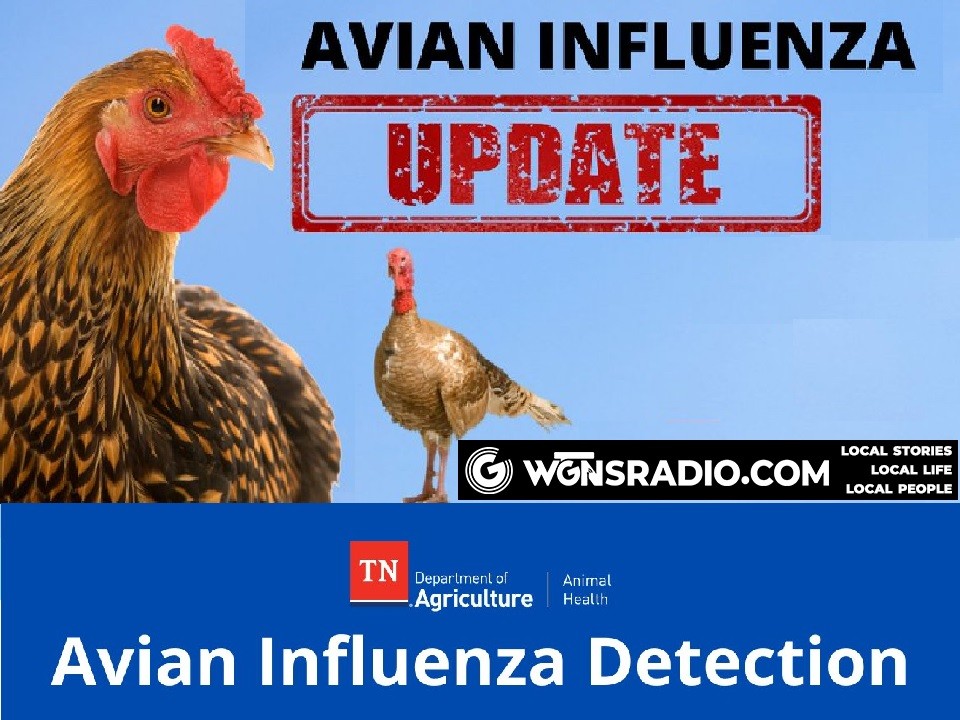(TENNESSEE) The Tennessee State Veterinarian is reporting a detection of highly pathogenic avian influenza (HPAI) in a commercial broiler chicken flock at a farm in Weakley County. The disease is now in all sections of the Volunteer State.
Following a sudden spike in bird deaths, lab tests confirmed the presence of H5N1 highly pathogenic avian influenza. HPAI is a highly transmissible disease known to be deadly for domesticated fowl. Fowl can be exposed to HPAI through human interactions and through contact with wild birds.
More Than Just Chickens
Since September of 2022, HPAI cases in Tennessee have sickened domesticated chickens, geese, ducks, and turkeys in Bledsoe, Davidson, Obion, Tipton, and Weakley Counties. HPAI has also been found in wild birds, including ducks, geese, vultures, and eagles in Tennessee.
“Unfortunately, HPAI continues to spread to farms of all sizes,” Tennessee State Veterinarian Dr. Samantha Beaty said. “There have been four previous detections in Weakley County affecting backyard flocks. It’s apparent this disease remains a threat to the poultry industry. We want bird owners to know that their consistent practice of thorough biosecurity measures is the best way to protect the health of their flocks. Introduction of this disease can be from wild birds gathering on your property or you can carry it into your flock if you are not wearing clean shoes and clothing.”
Control Zone
Animal health officials have established a 10 kilometer (6.2 mile) control zone surrounding the affected facility. Within the zone, poultry will be tested and monitored for illness and poultry movement requires permitting until the zone is released. Animal Health staff are contacting poultry owners within the control zone to answer questions and provide information. If you have concerns about your location, please email Animal.Health@tn.gov or call 615-837-5120 and staff will help determine if your flock is within the zone.
Although HPAI does not pose a food safety risk, no infected poultry will be allowed to enter the food supply. Poultry and eggs are safe to eat when handled and cooked properly. The risk of human infection with avian influenza during poultry outbreaks is very low. In fact, no transmission to humans was reported during the outbreak that affected commercial poultry farms in Tennessee in 2017.
Tennesseans who own backyard flocks or pet birds are encouraged to sign up for TDA’s email service, The Word on Birds. The service provides email alerts about health threats affecting domesticated birds in the state. Enroll at stateoftennessee.formstack.com/forms/2023_domesticated_bird_health_notifications.
Guidance for Bird Owners
- Wash your hands thoroughly before and after interacting with domesticated birds.
- Dedicate a pair of shoes to only be worn in coops or poultry houses and clean those shoes after each visit.
- Regularly disinfect any equipment used in coops or poultry houses and vehicles used for transporting birds.
- Deter wild birds from interacting with domesticated birds. Consider hanging pie pans or other noisemakers in trees or, if local rules allow, set off firecrackers intermittently or when you see vultures or geese on your property.
- Look for signs of illness and report a sudden increase in the number of sick birds or bird deaths to the Tennessee State Veterinarian’s office at 615- 837-5120 and/or USDA at 1-866-536-7593.
- Find more biosecurity tips and HPAI resources online at www.tn.gov/agriculture/businesses/animals/animal-health/avian-influenza.html.
In Tennessee, more than 600 family farms contribute to the commercial poultry industry. The state is a global leader for primary breeders, and an estimated 45 percent of the chicken consumed worldwide traces to genetics from Tennessee operations. Broiler chickens are among the state's top agricultural commodities, generating $376.2 million in cash receipts in 2021.





